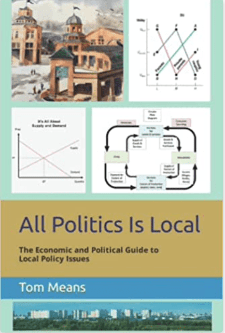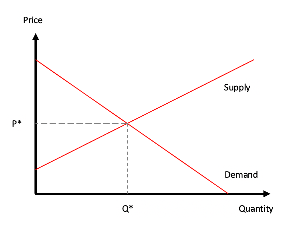

The Local Politician
Welcome
Welcome to The Local Politician, a site created as a resource center for those interested in exploring and discussing local politics.
Contrary to popular opinion, the local municipal government is where most of the important action takes place that directly impacts residents. By signing up to receive the blog you can engage in public discussion, provide updates on what's going on in your city, and suggest new topics.
This site includes:
- My first book: All Politics Is Local: A Guide to Local Politics from a Non-Political Perspective is available online on Amazon as a Kindle ebook or as a paperback. It is free to Kindle Unlimited members. In this book, I discuss my personal story as a local politician along with my take on development and other policy issues.
Just Released
- My second book: All Politics Is Local: The Economics and Political Guide to Local Policy Issues is now available in paperback or as a Kindle ebook. It is free to Kindle Unlimited members. This book presents a more systematic approach to local politics. I present foundational material on economics, public choice, finance, and statistical decision-making to show how these areas apply to local policies. I include more recent events that have captured the national media; defunding the police, eliminating single-family zoning, banning/regulating short-term rentals, regulating driver apps, food trucks, and much more
- The Local Politician Blog: A discussion on local politics, covering material found in the book and more current issues in local government.
- Resources: Journal articles and reports that apply to cities in any area.
All Politics is Local
A Guide to Local Politics from a Non-Political Perspective

Now Available on Amazon in Kindle and Paperback
Readers of All Politics Is Local: A Guide to Local Politics from a Non-Political Perspective will see another side to serving in local government. This book on local politics is unique in that it goes beyond discussing the simple structure of local government. It discusses the role of council appointees, how a city is organized, how to run a successful campaign, how to succeed in working with city staff and council colleagues, how to deal with special interest groups, the basics of local budgeting, and figuring out how to implement policies that affect residents. In each of these topics, the author points out the economic way of thinking and offers political advice about how to make good decisions and why it will lead to better outcomes.
Study Guide
Chapter Exercises
This section is under construction.
All Politics is Local
The Economic and Political Guide to Local Policy Issues

Now Available on Amazon in Kindle and Paperback
Readers of All Politics is Local: The Economic and Political Guide to Local Policy Issues will see another side to serving in local government. Similar to my first book, which covered local policy and my personal experiences on the city council, this book focuses more on local policies and ordinances passed by city councils. First, I present the economic, polictcal, fincnace and statitical foundations for analysing local government. I next cover how these foundations apply to local decision-making. Finally, I have updated the book to include more recent local policy issues. I have added chapters on defunding the police, eliminating single-family zoning, regulating short-term rentls, food truck, driver apps, and much more. Unlike other books on local government, I explain the economics of analyzing these policies and the politics behind them. My goal is to show how to make better decisions, which will lead to better public outcomes
The Local Politican Blog
Topics for Public Discussion
September 10, 2021During my summer break from blogging, I sold a home and decided to try and purchase a vacation...April 17, 2021The latest fad being promoted by planners, politicians, and political activists is to eliminate...March 19, 2021In my previous blog, I talked about what exactly is meant by the term “affordable” housing and...Resources

Local Government Documents

Some of Tom Means' Academic Research on Local Government
- Benefit Shares, the Crowding Parameter and Samuelsonian Publicness, Southern Economic Journal
- Empirical tests of the Samuelsonian Publicness Parameter: Has the right hypothesis been tested?, Public Choice
- Estimating the Publicness of Local Government Services: Alternative Congestion Functions, Southern Economic Journal
- Unintended or intended consequences? The effect of below-market housing mandates on housing markets in California, Journal of PublicFinance and Public Choice

Other Papers and Reports
- Does Land Development Pay for Itself? A Critique of Cost-of-Community-Services Studies, Mercatus Working Paper
- What Exactly is a Nexus Study and How Does It Apply to Housing Impact Fees
- A Response to the San Mateo Eviction Report (based on San Mateo County Eviction Report 2016)
- An Analysis of the Pacifica Reservation, Rent Stabilization, and Renter's Rights Act
- A Response to the Housing Crisis Hits Home in Concord (based on The Housing Crisis Hits Home in Concord)
About the Author

Tom Means received his Ph.D. in Economics from UCLA and has taught for over 40 years in the Economics Department at San Jose State University. In addition to this tenured position, he also taught various courses at the Naval Postgraduate School, Santa Clara University, San Francisco State University, and CSU-Northridge. He was the director of the Center for Economic Education (CEE) at SJSU, which was part of the California CEE and the National CEE. Working with the CEE allowed him to develop teaching materials and provide training to K-12 educators. Consulting in the private sector gave him the opportunity to apply his economic and statistical thinking to corporate problems.
In 1998, he stepped out of the ivory tower and decided to get involved in local government. Rather than running for an elected position, he applied to serve on a local advisory committee. He served six years on the Parks and Recreation Commission before deciding to run for the council in 2004. A huge underdog, he ran as an economist promising to use his economics training to guide his decision making and improve the welfare of the city. He did not solicit endorsements, raised little money, and was outspent by 3-4 times from heavily funded political candidates. To the surprise of many political pundits, he was elected to council, spending a measly $0.50 per vote, which was unheard of in federal, state, or local elections.
He immediately made headlines by invoking economic arguments during council debates. He would often hear the comment that he was using his economic thinking to solve city issues. He would politely reply, “that’s true but what principles are you using to guide your decision making.” While making plenty of headlines in the local papers, he quietly led the council on a pro-growth path that transformed the city into one of the premier cities in Silicon Valley. He was easily re-elected to a second term and was named Mayor for a one-year term.
Prior to holding political office Means produced several journal articles on local government production. During his 8-year council term, he produced more research on local government policies. He published a paper on Inclusionary Zoning, showing how it raised home prices and restricted the growth of new housing units. In other research, he pointed out the serious flaws in Cost of Community Service studies and Housing Nexus studies. After leaving the council, he returned to public service when he was appointed to the Rental Housing Commission (RHC) to help enact the city’s new rent control ordinance. He published several policy papers on the harm of restricting rents and how it impacted the supply of rent-controlled apartments. He eventually entered an early retirement program at SJSU and moved out of Silicon Valley to be closer to family.
© 2020. Built with Strikingly.




